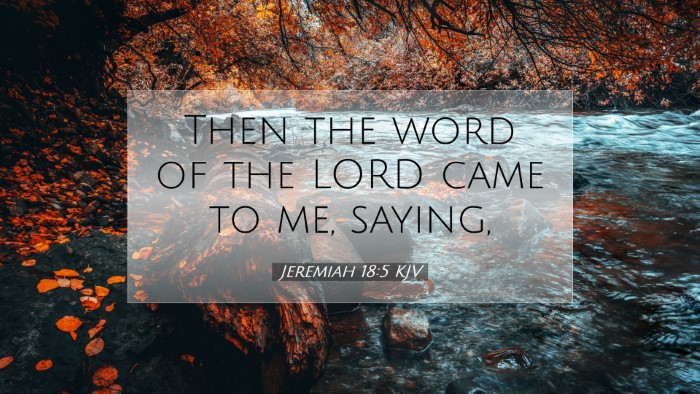Commentary on Jeremiah 18:5
Jeremiah 18:5 states: "Then the word of the Lord came to me, saying..." This verse is pivotal as it marks the transition of Jeremiah's prophetic message, emphasizing the sovereignty of God as a potter over His people. In this commentary, we will explore various insights from public domain commentaries, bringing forth the richness of theological reflections.
Understanding the Context
The context surrounding Jeremiah 18:5 is essential for grasping its full meaning. Jeremiah's prophetic ministry took place during a turbulent period in Israel's history, characterized by disobedience and impending judgment. The imagery of God as a potter is significant, illustrating His authority and the moldable nature of humanity.
The Image of the Potter
Matthew Henry draws attention to the metaphor of the potter and the clay, emphasizing the creative power of God. Just as a potter can reshape the clay, so God can reform nations and individuals according to His will. This imagery serves a dual purpose; it reassures us of God's sovereignty while also presenting a call to repentance.
Albert Barnes discusses how this metaphor extends beyond mere creation, highlighting God's ability to alter the fate of people based on their responses. He notes that while God's purpose is firm, the destiny of individuals can change depending on their actions. Barnes underscores the profound truth that God desires to mold us, but we must be willing to submit to His hands.
Adam Clarke expands on the potter-clay relationship, suggesting that the clay's pliability symbolizes the human heart's responsiveness to God's will. Clarke elaborates that while God's intention and purposes are established, He allows for human agency within His overarching plan. This balance between divine sovereignty and human responsibility is a critical theological theme.
The Divine Will and Human Agency
In Jeremiah 18:5, God directly communicates with Jeremiah, illustrating how He engages with His prophets. This engagement highlights God's initiative in revelation and underscores the call for obedience among His people. Here, the themes of divine will and human agency intersect in profound ways.
- Divine Initiative: God actively reveals His plans and intentions to Jeremiah, showing that God is not distant but intimately involved in the affairs of His creation.
- Call to Repentance: The verse implies a vital message: repentance can change the course of events for individuals and nations. The potter’s shaping of the clay is contingent upon the clay's willingness to be shaped.
The Nature of God’s Word
The phrase “the word of the Lord” indicates not only the authority of the message but also its life-giving power. Henry remarks that God's words, like a potter's hands, possess the potential to create and reshape. This highlights the transformative nature of divine communication.
Barnes emphasizes the credibility of God’s word, which stands firm even amid societal chaos. He encourages readers to trust in the promises and warnings articulated through the prophets, showcasing the consistent theme of fidelity in God’s character.
Theological Implications
Jeremiah 18:5 presents several theological reflections critical for pastors, students, and scholars. It provides a rich ground for understanding God's relationship with humanity.
- The Sovereignty of God: This verse encapsulates the theological affirmation that God exercises authority over creation. His ability to mold nations as a potter molds clay is a powerful reminder of divine omnipotence.
- Human Responsibility: The transformative potential inherent in God's word underscores human responsibility and the need for a responsive heart. This interaction reflects the dynamic nature of the relationship between God and His creation.
- Repentance and Redemption: The opportunity for repentance exemplifies God’s desire for reconciliation, revealing His merciful character. This aspect invites further exploration of the concepts of grace and redemption throughout Scripture.
Application for Today's Believers
As contemporary believers engage with Jeremiah 18:5, several applications emerge that are important for preaching and discipleship.
- Embrace Divine Molding: Just as the clay must be soft and pliable, believers are encouraged to remain open to God’s shaping. This involves cultivating a posture of humility and willingness to yield to His will.
- Faithfulness in Proclamation: Believers are called not only to hear God’s word but to proclaim it faithfully to others, understanding the weight and significance of divine revelation.
- Encouragement for Repentance: Pastors and leaders can use this verse to encourage communities to embrace the call for repentance, reminding them of the transformative power of God’s grace.
Conclusion
In conclusion, Jeremiah 18:5 serves as a profound reminder of God’s sovereignty, the significance of His word, and the necessity of human responsiveness. The insights drawn from the works of Matthew Henry, Albert Barnes, and Adam Clarke enrich our understanding of this verse, offering a holistic view that speaks both to the head and the heart of the believer.
This commentary is a call to reflect on how we allow ourselves to be shaped by the divine potter and respond to His word in active faith and repentance. Let us be ever mindful that we are not just passive clay but participants in the creative process of becoming who God intends us to be.


